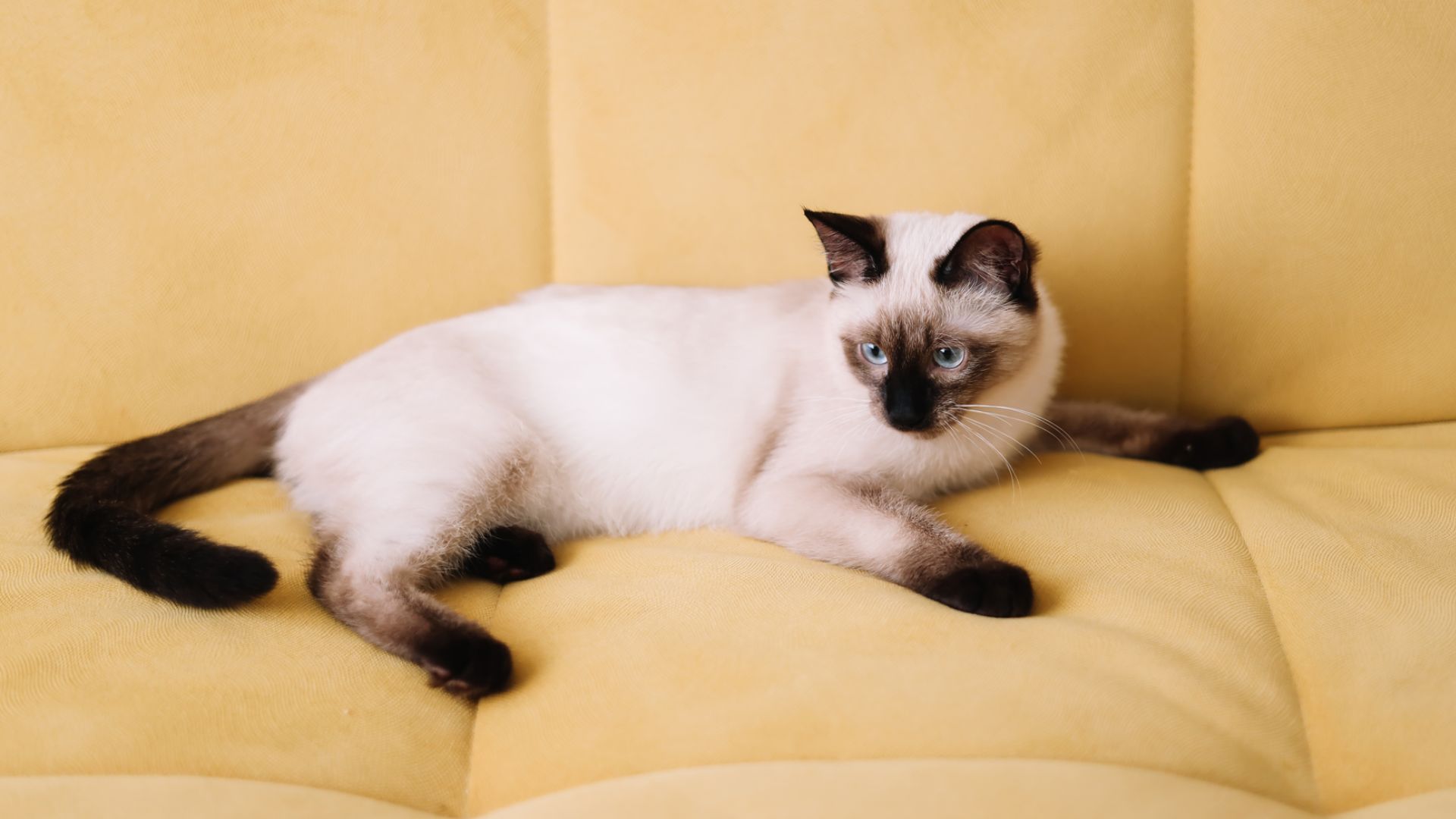
Siamese cat
Table of Contents
The Siamese cat is a distinctive and elegant breed known for their striking blue almond-shaped eyes, short coat, and color-point pattern. They are a popular breed known for their social nature, intelligence, and playful personalities.
Siamese cats are native to Thailand and are one of the oldest recognized cat breeds.
They have a unique coat pattern with color points on the face, ears, paws, and tail, and are born completely white, developing their color points later. Siamese cats are highly intelligent and can be trained to walk on a lead and play with toys.
They are also very vocal and require an experienced owner who can provide them with a high level of enrichment, including simulated hunting games and interactive play.
Siamese cats are not ideal for families with young children or other pets, as they can be demanding and require a calm environment.
They are generally healthy but can be prone to certain genetic health conditions, such as hypertrophic cardiomyopathy (HCM) and strabismus.
When considering a Siamese, it’s advisable to prioritize adopting from rescue organizations or shelters to provide a loving home to a cat in need.
However, if you decide to purchase a Siamese kitten, it’s crucial to choose a reputable breeder who follows ethical practices and prioritizes the well-being of their cats.
Temperament of a siamese cat
The Siamese cat is known for its distinctive appearance, with striking blue almond-shaped eyes, short coat, and color-point pattern on the face, ears, paws, and tail.
They are a popular breed due to their intelligence, playful nature, and affectionate personalities. Siamese cats are sociable and friendly, often forming strong bonds with their owners and other pets.
They are also known for their vocalization, often “talking” to their owners and meowing for attention, food, or play. Siamese cats require mental and physical stimulation, enjoying interactive play sessions and puzzles.
They are generally healthy, but can be prone to certain genetic health conditions, such as hypertrophic cardiomyopathy (HCM) and strabismus.
When considering a Siamese, it is recommended to prioritize adopting from rescue organizations or shelters, or to choose a reputable breeder who follows ethical practices and prioritizes the well-being of their cats.
Average lifespan of Siamese cat
The average lifespan of a Siamese cat is between 15 to 20 years, with some Siamese cats living even longer with proper care and a healthy lifestyle.
Siamese cats are known for their longevity compared to many other cat breeds, making them a great choice for those looking for a long-term feline companion.
Common health issues of a Siamese cat
Siamese cats are prone to certain health issues, some of which are genetic and some of which are common in all cats. Here are some of the most common health issues in Siamese cats:
1. Amyloidosis: This is a genetic condition that affects Siamese cats, particularly those with a flame point coloration. It is characterized by the abnormal accumulation of amyloid protein in various organs, leading to organ dysfunction.
Symptoms may include weight loss, increased thirst, and kidney or liver problems. Early detection and proper management can help improve the quality of life for cats affected by amyloidosis.
2. Dental problems: Siamese cats are prone to dental problems, including periodontal disease, gingivitis, and dental plaque buildup. Regular dental care, including brushing their teeth and providing dental treats or toys, can help maintain their oral health.
Additionally, scheduling regular veterinary dental cleanings is essential for detecting and treating any dental issues early on.
3. Respiratory conditions: Siamese cats, with their distinctive wedge-shaped heads and narrow nasal passages, are susceptible to respiratory conditions. They may experience difficulty breathing, snoring, or even develop upper respiratory infections.
Environmental factors such as dust, smoke, and allergens can worsen their symptoms. Regular cleaning of their living space and ensuring good air quality can help alleviate respiratory issues.
4. Eye problems: Siamese cats may be more prone to certain eye problems, including strabismus (crossed eyes), progressive retinal atrophy (PRA), and nystagmus (involuntary eye movement).
While strabismus is typically not a serious health concern, it’s always recommended to have a veterinarian evaluate any eye abnormalities.
PRA is an inherited condition that affects the retina, leading to gradual vision loss. Nystagmus is a condition characterized by involuntary eye movement.
While it doesn’t typically affect their overall health, it’s important to have a veterinarian assess the severity and potential underlying causes.
5. Gastrointestinal issues: Siamese cats may be more prone to certain gastrointestinal issues, such as inflammatory bowel disease (IBD) and gastritis. Symptoms may include chronic vomiting, diarrhoea, and weight loss.
A balanced diet, proper hydration, and regular veterinary check-ups are crucial in managing and treating these conditions. Dietary adjustments, including hypoallergenic or prescription diets, may be recommended by your veterinarian.
6. Vestibular disease: This is a common ailment among Siamese cats, and it can be difficult to treat. Cats with vestibular disease or feline vestibular syndrome have problems with their inner ear. Symptoms may include head tilting, loss of balance, and falling over. Treatment may include medication and environmental changes to help the cat feel more stable.
7. Cancer: Siamese cats are prone to certain multiple cancers, and early detection is key. Some Siamese cats may not develop cancer until later in life, but some may develop it at a younger age. Regular veterinary check-ups and monitoring for any unusual lumps or bumps can help detect cancer early.
Regular veterinary check-ups, preventive care, and a healthy lifestyle can help minimize the impact of these health issues. It’s important for owners to be aware of the potential health concerns associated with this breed and to consult with a veterinarian for specific guidance and care tailored to their cat’s needs.
How much is a Siamese cat?
The cost of a Siamese cat can vary depending on various factors. On average, a Siamese kitten can cost anywhere from around $600 to $800.
However, for premium origin Siamese cats with noticeable features, the price can range from $1,000 to $2,500, depending on the breeder. Additionally, it costs around $75 to $100 to adopt a Siamese cat from a shelter or rescue organization.
Factors that affect the price of a Siamese cat
Some factors that affect the price of a Siamese cat include:
1. Breeders: The reputation and quality of the breeder can significantly impact the cost of a Siamese cat. High-quality breeders who specialize in breeding Siamese cats with excellent pedigrees, health guarantees, and desirable temperaments will charge more for their kittens than those who do not.
2. Color and Pattern: The color and pattern of a Siamese cat can also influence the cost. Siamese cats come in various colors and patterns, with some being rarer than others. The more unique or rare the color or pattern, the higher the price of the kitten. For example, Siamese kittens with chocolate patterns are the most expensive due to the rarity of this coloration.
3. Age: The age of the Siamese cat can affect the cost. Kittens are typically more expensive than adult cats, as they require more care and attention in their early stages of development. However, older cats may also be more costly if they are well-trained, well-socialized, and have a desirable personality.
4. Gender: The gender of a Siamese cat can impact the price. Female cats are generally more expensive than males, as they are in higher demand due to their breeding potential. However, male Siamese cats can also be costly if they come from excellent bloodlines or have desirable physical features.
5. Location: The location where you purchase a Siamese cat can also affect the cost. In areas where the breed is rare or the cost of living is high, the price of Siamese cats may be higher due to increased demand and expenses.
Difference in price between a male and female Siamese cat
The price difference between male and female Siamese cats can vary based on factors such as gender, lineage, and physical features. Generally, female Siamese cats are more expensive than males due to their breeding potential and demand.
On average, male Siamese cats can cost between $600 to $800, while female Siamese cats may range from $800 to $1,200 or more, depending on the breeder and specific characteristics.
Additionally, the cost of Siamese kittens can be influenced by factors like coloration, pedigree, and the reputation of the breeder.
Some reputable Siamese cat breeders
Some reputable Siamese cat breeders include:
1. Marie from Siamese Royalty
2. Friemoth Family Cats (Lorna Friemoth)
3. Sanura Siamese
4. Katz Meow Cattery
These breeders are known for their professionalism, care for their cats, and adherence to breeding standards. It’s essential to do thorough research and consider visiting the breeder’s home to ensure the kittens are raised in a clean and healthy environment.
How to verify the reputation of a Siamese cat breeder
To verify the reputation of a Siamese cat breeder, consider the following:
1. Check if the breeder is a member of a reputable cat organization, such as the Cat Fanciers’ Association (CFA) or The International Cat Association (TICA). These organizations have strict breeding standards and require their members to adhere to certain ethical guidelines.
2. Ask for health and vaccine records for the kitten, as well as a written health guarantee. A reputable breeder should be transparent about the health of their cats and be willing to provide documentation to support their claims.
3. Visit the breeder’s home or cattery to see the conditions in which the cats are raised. The environment should be clean, uncrowded, and relatively odorless, with healthy and active cats.
4. Ask about the breeder’s breeding practices and philosophy. A reputable breeder should be knowledgeable about the breed and genuinely care about the welfare of their cats, rather than just seeing them as a source of income.
5. Check for reviews or testimonials from other buyers or organizations. This can provide insight into the breeder’s reputation and the quality of their cats
6. Be wary of breeders who sell through third parties, such as pet stores, as this can be a sign of a large-scale commercial breeding operation or “mill”.
7. Look for breeders who are active in exhibiting their cats at shows, as this can indicate a commitment to improving the breed and adhering to breeding standards.
8. Be prepared for a thorough screening process, as a responsible breeder will want to ensure that their kittens are going to a good home.
9. Ask about the breeder’s policies regarding spaying/neutering and registration papers, as this can impact the long-term care and ownership of the cat.
10. Trust your instincts and be cautious of breeders who seem pushy or unprofessional.
Continue reading: Serval Cat


